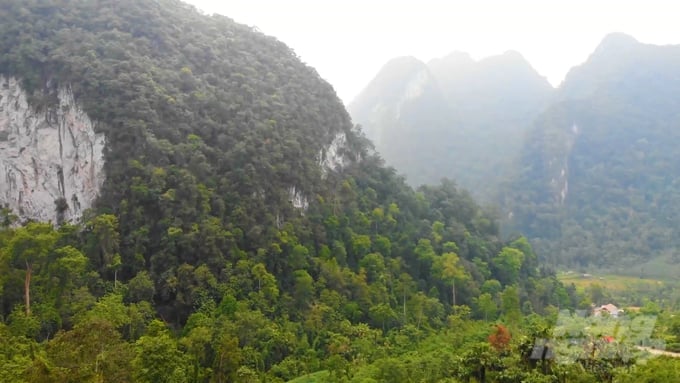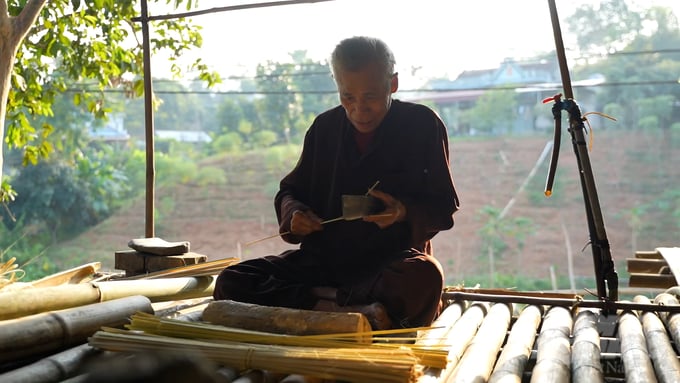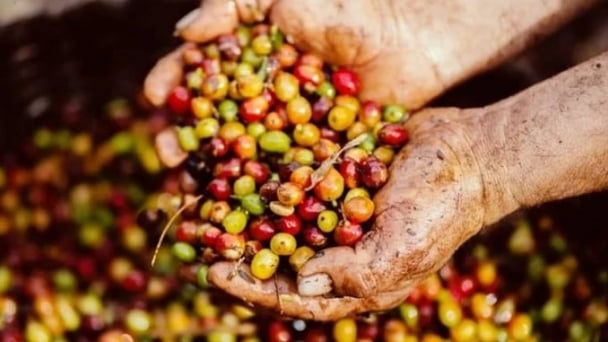June 18, 2025 | 01:22 GMT +7
June 18, 2025 | 01:22 GMT +7
Hotline: 0913.378.918
June 18, 2025 | 01:22 GMT +7
Hotline: 0913.378.918

Xuan Son National Park is Vietnam's only national park to house a primeval forest on limestone mountains. The forest covers over 2,400 hectares at an altitude ranging from 700 meters to 1,300 meters. Photo: Quang Dung.
Located approximately 120 kilometers west of central Hanoi, Xuan Son National Park is one of the 15 largest national parks in Vietnam. Known for its natural landscape and biodiversity, the National Park is among the most important sites in Northern Vietnam.
Xuan Son National Park covers a total natural area of 15,048 hectares, located across the communes of Xuan Son, Xuan Dai, Kim Thuong, Dong Son, and Lai Dong communes in Tan Son district, Phu Tho province.
It is also Vietnam's only national park with a primeval forest on limestone mountains. The forest covers over 2,400 hectares at an altitude ranging from 700 meters to 1,300 meters. The park is home to 365 animal species, including 46 species listed in the Vietnam's Red Data Book and 18 species listed in the IUCN Red List of Threatened Species. Additionally, it hosts species endemic to the Northwest animal system, such as Phayre's leaf monkey, baboon, Burmese ferret-badger, red-bellied tree squirrel, bear, leopard, and various avian species including pheasants, peacock-pheasants, and eagles.
In addition to the allure of its diverse flora and fauna, Xuan Son National Park features numerous captivating natural landscapes, including three over-1,000-meter mountain peaks: Voi Mountain, Ten Mountain, and Can Mountain, with an intricate cave system. Rivers and streams such as the Lap Stream and Thang Stream, along with multiple waterfalls over 50 meters high, blend the silver of the waterfalls with the green of the ancient forests, creating a majestic and poetic scenery.
Outside of its scenic advantages, the National Park boasts a relatively pleasant climate; with the mornings resembling a fresh spring, the afternoons sunny summers, the evenings cool autumns, and the nights chilly winters. As a result, tourists can visit the park at any time of the year to explore its natural beauty.

The core zone of Xuan Son National Park is home to 327 households with a population of 1,300, primarily from the Muong and Dao ethnic groups. Photo: Quang Dung.
Xuan Son is a disadvantaged commune in Tan Son district. It is also the only commune located in the core zone of Xuan Son National Park. It is currently home to 327 households with a population of 1,300, primarily from the Muong and Dao ethnic groups.
"Due to its unique geographical location, the government of Xuan Son commune has instructed local residents to focus on developing community and eco-tourism in association with forest protection over the last few years. This initiative is also a sustainable way to eradicate hunger and reduce poverty for the local community in the immediate future," remarked Ha Thi Yen, Chairwoman of the Xuan Son Commune People's Committee.
The residents of Xuan Son commune have preserved their ethnic cultural identity through clothing articles, festivals, and daily activities such as handicraft and brocade weaving, embroidery, traditional rituals, dances, and deer wine drinking. In addition, visitors to Xuan Son National Park have the opportunity to enjoy an extensive range of local specialties and unique dishes such as multi-spurred chicken, five-color sticky rice, bamboo-tube rice, sour meat, Melientha, and river fish.
According to statistics compiled by the Xuan Son Commune People's Committee, the national park receives over 10,000 tourists on an yearly average. This substantial figure indicates the potential and advantages of developing tourism in the region. The local government, in collaboration with the Management Board of Xuan Son National Park, frequently warns residents and tourists against harming the forest and littering, as well as encouraging them to protect the green, clean, and beautiful environment of the national park.
The tourism infrastructure at Xuan Son National Park has also received increasing investment in recent years. Additionally, the park is gradually shaping its community-based eco-tourism products. As a result, this tourist destination is attracting a growing number of visitors looking to explore and experience. The growth contributes to improving the economic life of local residents, protecting the forest with a focus on sustainability, and utilizing the potential and strengths of the region.
Translated by Nguyen Hai Long
![Turning wind and rain into action: [7] Early disaster warnings help marine farmers minimize losses](https://t.ex-cdn.com/nongnghiepmoitruong.vn/608w/files/news/2025/06/17/z6704423696987_15fd32ffc26d590d204d520c9dac6786-nongnghiep-142942.jpg)
(VAN) In recent years, thanks to early disaster warnings and forecasting, marine farmers in Khanh Hoa province have been able to reduce risks and losses, thereby improving production efficiency.
![Turning wind and rain into action: [6] ‘Four on-the-spot’ disaster management software](https://t.ex-cdn.com/nongnghiepmoitruong.vn/608w/files/news/2025/06/17/e5a48259d6a262fc3bb3-nongnghiep-183800.jpg)
(VAN) By simply activating the scenario on the disaster management software, the relevant authorities immediately know how many households need to be evacuated, where to evacuate them to, and by what means of transportation…
![Turning wind and rain into action: [5] Hue applies modern technology in disaster forecasting](https://t.ex-cdn.com/nongnghiepmoitruong.vn/608w/files/news/2025/06/17/z6704423696987_15fd32ffc26d590d204d520c9dac6786-nongnghiep-093938.jpg)
(VAN) In Hue city, modern technology has recently been applied in meteorological and hydrological forecasting and warning, helping to reduce the damage caused by natural disasters.

(VAN) A cutting-edge farming technique being implemented on an experimental ranch in Arizona's Sonoran Desert has already saved a billion gallons of water over five years, according to Civil Eats.

(VAN) Poultry and pig production and the environment can be boosted through enhanced water technology, according to new research.

(VAN) Coffee prices on June 16, 2025 are unchanged. In Vietnam, local trading prices are holding steady, ranging around VND 112,000 – VND 112,500/kg.
![Turning wind and rain into action: [4] Bringing climate bulletins to remote and isolated areas](https://t.ex-cdn.com/nongnghiepmoitruong.vn/608w/files/linhnhp/2025/06/14/1152-z6704423696987_15fd32ffc26d590d204d520c9dac6786-nongnghiep-151141.jpg)
(VAN) The Vietnam Agriculture and Nature Newspaper interviewed Mr. Vu Thai Truong, Acting Head of Climate Change and Environment at UNDP Vietnam, to gain deeper insight into how climate bulletins are delivered to farmers.